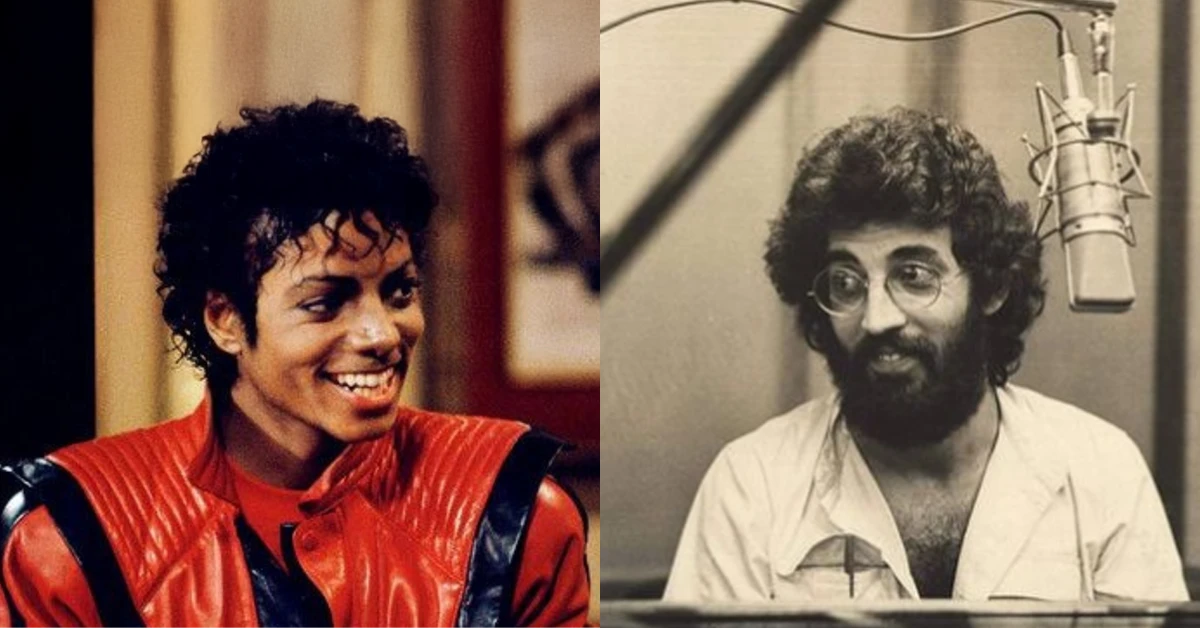In the annals of music history, few stories capture the tension between artistic integrity and commercial opportunity quite like the Ivan Lins vs Michael Jackson negotiation. Picture this: you’re offered a spot on what would become the best-selling album of all time, Thriller. Now imagine saying no. This is the incredible true story of Brazilian composer Ivan Lins and his partner Vitor Martins, who, despite immense pressure and the allure of global fame, refused a deal they deemed unfair. Their decision offers profound insights into the music industry, the value of art, and the courage to stand your ground.
The Context: A Dream Opportunity Meets a Harsh Reality
Nowadays, Ivan Lins has an impressive catalog of over 800 songs, 36 albums, and 11 Grammy nominations. In the early 1980s, he was already a celebrated composer in Brazil. His talent was undeniable, and his compositions had already caught the ear of legendary producer Quincy Jones, who had previously worked with Lins and Martins, leading to their songs being recorded by jazz greats like George Benson, Ella Fitzgerald, and Sarah Vaughan. The stage was set for an even bigger opportunity.
Quincy Jones, then producing Michael Jackson’s next album, Thriller, invited Lins and Martins to a party. There, he presented them with an offer that seemed like a lottery win: a song of theirs, “Novo Tempo,” was wanted for Michael Jackson’s upcoming album. The excitement was palpable; this was the chance of a lifetime for Brazilian music to reach unprecedented global heights.
However, the dream quickly collided with a harsh reality when the contract arrived. The terms were shockingly unfavorable, offering the composers a mere 10% of the royalties. This was the turning point, leading to a decision that would echo through their careers and serve as a powerful lesson for artists worldwide.
Lesson 1: The Courage to Say No – Valuing Your Art Above All Else
The most striking lesson from the Ivan Lins vs Michael Jackson deal is the sheer courage it took to refuse such an offer. Imagine the pressure: saying no to Quincy Jones, one of the most powerful figures in the music industry, and to Michael Jackson, who was on the cusp of becoming the biggest artist on the planet. The temptation to accept, even on unfavorable terms, must have been immense, driven by the promise of exposure, prestige, and potential future opportunities.
Yet, Lins and Martins chose to say no. Their decision was a profound act of artist self-worth and artistic integrity. To accept a paltry 10% for their song “Novo Tempo” to be included on the Thriller album was, in their eyes, to devalue their creative contribution and set a dangerous precedent.
This act highlights a critical principle in music contract negotiation: true value is not solely determined by the size of the platform, but by the inherent worth of the creative work itself. As Ivan Lins often states in interviews, he doesn’t regret the decision, emphasizing that “to say no, you need to value yourself.”
This lesson is a powerful reminder that artists must be their own fiercest advocates, even when facing overwhelming pressure from industry giants. The courage to walk away from unfavorable terms, regardless of the prestige attached, is fundamental to maintaining long-term artistic and financial integrity.
Lesson 2: Understanding Contract Terms and Fair Compensation
The core of the dispute lay in the proposed music publishing rights and royalty split. In the music industry, composers and lyricists typically earn royalties from various sources, including mechanical royalties (from sales and streams), performance royalties (from public broadcasts), and synchronization royalties (from use in film/TV). A 10% share for the composition, especially for a song on an album of Thriller‘s eventual magnitude, was indeed problematic.
Compositions are the lifeblood of the music industry. Without songs, performers have no material, and record labels have no product. This underscores the fundamental value of the songwriter. Lins and Martins, with their extensive experience, understood the long-term implications of such a lopsided deal. They hired legal counsel, paying out of their own pocket, to try and negotiate better terms.
This emphasizes the crucial importance of seeking expert advice in music contract negotiation. Many artists, especially emerging ones, might overlook this step, but it’s essential to protect one’s intellectual property and ensure fair compensation. The fact that they only managed to negotiate an additional 10% (bringing it to 20%) further illustrates the power imbalance they faced.
Understanding the different types of royalties and how they’re calculated is crucial for any artist entering into publishing agreements. Performance royalties alone can generate substantial income over decades, making the initial percentage split critically important for long-term financial security.
Lesson 3: The Long-Term View vs. Immediate Gain
At the time of the negotiation, no one could have predicted that Thriller would become the best-selling album in history, selling over 120 million copies worldwide. For Lins and Martins, the offer was a “lottery ticket,” a chance for immediate, unprecedented exposure. The temptation to seize this immediate gain, regardless of the terms, must have been immense.
However, their decision to refuse was a testament to a long-term perspective on their careers and the value of their art. They prioritized their self-respect and the principle of fair compensation over the potential for massive, albeit unfairly distributed, financial gain. Ivan Lins jokes that if things had been different, he might be on a “paradisiacal beach in the Fiji Islands” today, but he maintains he has no regrets.
This lesson is particularly relevant in today’s fast-paced Brazilian music industry, where artists are often pressured to accept unfavorable deals for quick exposure on platforms. The Ivan Lins vs Michael Jackson story serves as a powerful reminder that sometimes, the most courageous and ultimately beneficial decision is to walk away from a deal that compromises your long-term value and integrity.
The long-term view also considers the precedent that accepting unfavorable terms sets for future negotiations. Artists who consistently undervalue their work may find it difficult to command fair compensation later in their careers.
Lesson 4: Negotiation in High-Stakes Environments
The negotiation process itself offers valuable insights into high-stakes environments. Quincy Jones’s approach, while seemingly generous, also contained subtle pressure tactics. By showing Lins and Martins a bag full of tapes from other composers, he conveyed a dual message: “Look at all the offers we received. They don’t matter—we want you,” however, the unspoken but implied message was “if for some reason we don’t close the contract, there’s no shortage of musicians who want to be on Michael’s next album.”
This is a classic negotiation tactic, creating a sense of urgency and implying abundant alternatives. Lins and Martins, despite their outrage, attempted to negotiate. They didn’t just walk away immediately; they engaged with lawyers, trying to find a middle ground. This shows a pragmatic approach to a difficult situation.
However, the rigid deadlines for the Thriller album’s recording ultimately worked against them. The project couldn’t wait for protracted legal battles, and so, “Novo Tempo” was ultimately not included. This highlights that in high-pressure negotiations, external factors like deadlines can significantly impact leverage.
Understanding the other party’s constraints and deadlines can be crucial in music contract negotiation. While Lins and Martins stood firm on their principles, the industry’s relentless pace meant that the opportunity, once missed, was gone. It underscores the need for artists to be prepared for such scenarios and to understand the broader context of industry demands.
Lesson 5: The Power of Precedent and Self-Respect
Finally, the Ivan Lins vs Michael Jackson deal is a powerful lesson about the importance of setting a precedent for oneself and for the industry. By refusing to submit to unfavorable conditions, Lins and Martins sent a clear message about their worth. This act of self-respect, even if it meant sacrificing a massive financial opportunity, reinforced their artistic integrity.
The story isn’t just about a missed opportunity. It’s about something bigger—the courage to value your art, even when the biggest names in the industry are calling. This is a beautiful lesson about valuing yourself, not letting the cultural industry disrespect you out of fear of not being part of this or that project.
In an industry often criticized for exploiting artists, Lins and Martins’ stand serves as an inspiring example. Their decision, though personal, resonates as a universal message: artists must protect their creative and financial interests. It encourages a mindset where self-worth is not negotiable, regardless of the perceived prestige of the project.
This precedent-setting behavior also influences how the industry treats artists in general. When artists consistently stand up for fair treatment, it gradually shifts industry standards and expectations. Each individual decision to refuse unfavorable terms contributes to a broader movement toward more equitable practices.
The Broader Impact on the Music Industry
The Ivan Lins vs Michael Jackson story has implications that extend beyond the individuals involved. It highlights systemic issues in the music industry regarding power dynamics between artists and industry executives. The story demonstrates how even established, successful composers can face pressure to accept unfavorable terms when dealing with major industry figures.
This case study has become a reference point for discussions about artist self-worth and fair compensation in the music industry. It’s frequently cited in music business courses and artist development programs as an example of principled decision-making under pressure.
The story also illustrates the importance of having strong legal representation and understanding the full implications of publishing agreements. Many artists have learned from Lins and Martins’ experience, recognizing the need to thoroughly evaluate contracts regardless of the prestige associated with the opportunity.
Modern Relevance and Continuing Lessons
In today’s digital music landscape, the lessons from the Ivan Lins vs Michael Jackson negotiation remain highly relevant. Streaming platforms, social media exposure, and viral marketing create new pressures for artists to accept unfavorable terms in exchange for potential exposure. The fundamental principles demonstrated by Lins and Martins—understanding your worth, seeking proper legal counsel, and maintaining long-term perspective—are as crucial today as they were in the 1980s.
Contemporary artists facing similar dilemmas can draw inspiration from this story. Whether it’s a major label deal, a high-profile collaboration, or a lucrative licensing opportunity, the core question remains the same: does this agreement respect the value of my creative work and set a positive precedent for my career?
The story also serves as a reminder that success in the music industry isn’t solely measured by association with major names or projects. True success includes maintaining artistic integrity, receiving fair compensation, and building sustainable career foundations.
Conclusion: A Legacy of Integrity
The story of Ivan Lins vs Michael Jackson and the “Novo Tempo” deal is more than just a fascinating anecdote from Thriller album history. It’s a profound case study in artistic integrity, negotiation, and the courage to value one’s work. While the world gained Thriller without “Novo Tempo,” the music community gained an enduring lesson from Ivan Lins and Vitor Martins: that some things, like self-respect and fair compensation for one’s art, are simply not for sale.
Their “no” echoed louder than any “yes” could have, leaving a legacy of unwavering principle that continues to inspire artists today. For those eager to delve deeper into this captivating narrative and explore other untold stories where Brazilian music almost conquered the world, be sure to watch our comprehensive video analysis that provides additional context and insights into this remarkable chapter of music history.
References
- The MISSING HIT on Michael Jackson’s Thriller? | Ivan Lins Untold Story. The Stringuy YouTube Channel. https://youtu.be/Yms31ysXeQw?si=7c8OlE1-qizhiAFD
- Ivan Lins Official Website. http://www.ivanlins.com.br (Used for general background on Ivan Lins’ career and compositions)
- Thriller (album). Wikipedia. https://en.wikipedia.org/wiki/Thriller_(album)
- Quincy Jones Official Website. https://www.quincyjones.com (Used for general background on Quincy Jones’ production work and collaborations)
- Music Licensing FAQ. ASCAP. https://www.ascap.com/help/ascap-licensing (General information on music publishing, not directly cited in text but used for background understanding)
- Copyright and Intellectual Property. Berklee Online. https://guides.library.berklee.edu/copyright (General context on music contract negotiation and copyright)





